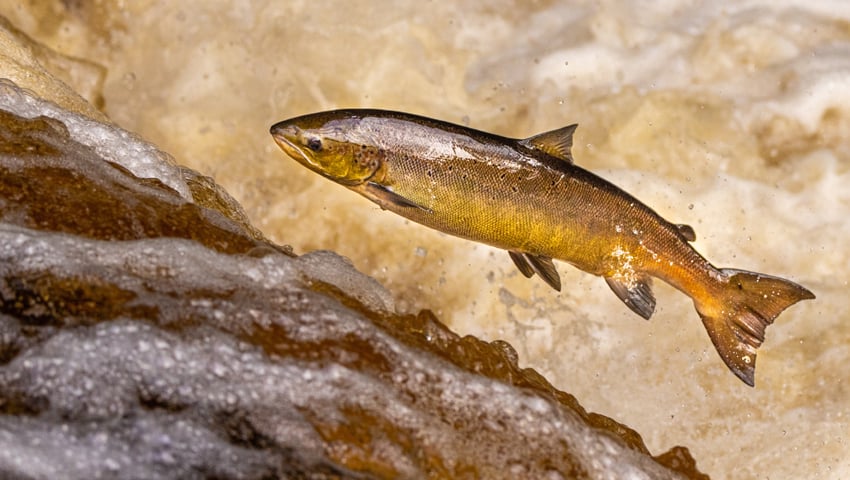The Missing Salmon Alliance (MSA), a collective of passionate conservation organisations with a common interest in improving the plight of Atlantic salmon, is demanding greater fish protection measures and effective mitigation of major fish kills set to take place at EDF Energy Hinkley Point C.
Britain’s new nuclear power station at Hinkley Point C, already over budget and behind schedule, is set to draw a huge amount of water (120,000 litres per second) from the Bristol Channel to cool nuclear reactors. This is the equivalent of three Olympic swimming pools per minute and twice the average flow of the River Thames in London. An Environment Agency (EA) study concluded that 178 tonnes of fish will be sucked into the pipes per year, and an independent panel warned in a report to the Welsh government in 2021 that the power station could capture up to 182 million fish per year. It is likely that most of these will not survive.
The area surrounding Hinkley Point C is a highly designated Special Area of Conservation (SAC), Site of Special Scientific Interest (SSSI), and Ramsar site, with a number of designated rivers that are home to several endangered, protected, and commercially important species such as Atlantic salmon, shad, elver eel (critically endangered), conger eel, brown shrimp, cod, bass, whiting, flounder, sole and thornback ray.
There are only four spawning populations of twait shad in the UK – in the Tywi, Usk, Wye, and Severn – and data shows that there is significant risk of the scheme wiping these out. Acoustic tracking of the species from the River Tywi, funded by charities and universities, shows that up to 33% of the population may be using the area around the Hinkley Point C abstraction zones.
When EDF was granted planning in 2013, it was agreed that an Acoustic Fish Deterrent (AFD) – an effective means of scaring fish away from the four huge offtakes that will draw the water – would be installed. However, after planning was granted, EDF applied to have the requirement of the ADF system removed from the plans, arguing that maintenance of the system would be dangerous. This ended in a public enquiry, which EDF lost on the basis that it risked damaging a number of highly protected species such as salmon and shad.
The Secretary of State ruled against the application, considering that migratory species [Atlantic salmon, twait and allis shad] have been declining, are considered in a poor state and that even low-level impacts on a population at risk can be significant. He also considers that the marine stocks are in a poor or vulnerable state and that impacts of the scale indicated by the [removal of the AFD] would have a potential material effect on these stocks. Since that ruling, IUCN has reclassified (2023) the status of Atlantic salmon from “Least Concern” since 2014, to “Near Threatened” at a global scale and “Endangered” in Great Britain.
Dylan Roberts, Head of Fisheries at MSA member the Game & Wildlife Conservation Trust, said, “Wild Atlantic salmon migrate through the Bristol channel each spring from a number of recognised rivers in the area. They are now classified as Endangered in Great Britain on the IUCN Red List. It is critical that a real-time assessment of salmon smolts migrating through the area is funded by EDF. Without this assessment, how can they say that the environmental risks are minimal? This is not solely about salmon; it’s a much broader remit. It’s about conserving our wider biodiversity against a massive state project, which is steamrolling through and putting two fingers up to the environment.”
However, now, EDF is continuing to push for the AFD system to be removed from its plans by seeking a material change to the Development Consent Order. This is currently being consulted on and the consultation will end on 29 February 2024.
The Missing Salmon Alliance understands that the AFD system is unlikely to now be included within EDF’s plans. As mitigation for the removal of the AFD system, EDF has suggested compensatory creation of wetland habitat for birds and other species, and enhancements to fish passage on a small number of existing weirs.
Mark Lloyd, Chief Executive of MSA member the Rivers Trust, said, “Our member Rivers Trusts have delivered countless habitat improvement projects on the many rivers flowing into the Severn Estuary, including the Unlocking the Severn project, which opened up many hundreds of miles of the river to migratory fish including shad and cost millions of pounds to complete. The positive impact of these projects will be greatly diminished if the migratory fish they benefit are sucked into the power station, which appears to be very likely. EDF must face up to their environmental responsibilities in this vitally important, vulnerable environment and the highly threatened species living there.”
Penelope Gane, Head of Practice of MSA member Fish Legal, said, “The fact that EDF are backtracking on a key protection for salmon at this late stage suggests that fish welfare was never really a top priority for this energy giant. Its plans to improve fish passage on a couple of weirs in mitigation doesn’t come close to offsetting the potential damage to this beleaguered species. If their plans go ahead, it could be a nail in the coffin for salmon on the rivers Wye, Usk and Severn.”
